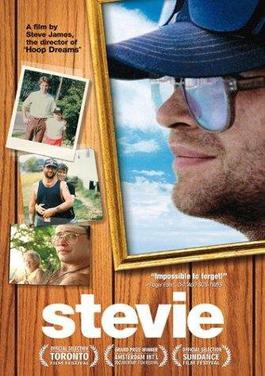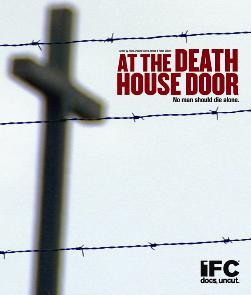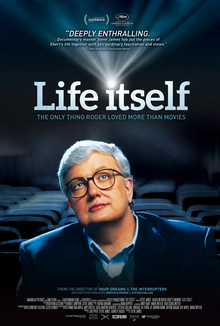Related Research Articles
Cinéma vérité is a style of documentary filmmaking developed by Edgar Morin and Jean Rouch, inspired by Dziga Vertov's theory about Kino-Pravda. It combines improvisation with use of the camera to unveil truth or highlight subjects hidden behind reality. It is sometimes called observational cinema, if understood as pure direct cinema: mainly without a narrator's voice-over. There are subtle, yet important, differences between terms expressing similar concepts. Direct cinema is largely concerned with the recording of events in which the subject and audience become unaware of the camera's presence: operating within what Bill Nichols, an American historian and theoretician of documentary film, calls the "observational mode", a fly on the wall. Many therefore see a paradox in drawing attention away from the presence of the camera and simultaneously interfering in the reality it registers when attempting to discover a cinematic truth.

Hoop Dreams is a 1994 American documentary film directed by Steve James, and produced by Frederick Marx, James, and Peter Gilbert, with Kartemquin Films. It follows the story of two African-American high school students, William Gates and Arthur Agee, in Chicago and their dream of becoming professional basketball players.

Jean Rouch was a French filmmaker and anthropologist.

The New Americans is a seven-hour American documentary, produced by Kartemquin Films, which was originally broadcast on American television over three nights on the Public Broadcasting Service (PBS) in late March 2004.

Stevie is a 2002 film by documentarian Steve James, and Kartemquin Films.

ITVS is a service in the United States which funds and presents documentaries on public television through distribution by PBS and American Public Television, new media projects on the Internet, and the weekly series Independent Lens on PBS. Aside from Independent Lens, ITVS funded and produced films for more than 40 television hours per year on the PBS series POV, Frontline, American Masters and American Experience. Some ITVS programs are produced along with organizations like Latino Public Broadcasting and KQED.
Kartemquin Films is a four-time Oscar-nominated 501(c)3 non-profit production company located in Chicago, Illinois, that produces a wide range of documentary films. It is the documentary filmmaking home of acclaimed producers such as Gordon Quinn, Steve James, Peter Gilbert, Maria Finitzo, Joanna Rudnick, Bing Liu, Aaron Wickenden, and Ashley O’Shay (Unapologetic).
Gordon Quinn is artistic director and founding member of Kartemquin Films and a 2007 recipient of the MacArthur Award for Creative and Effective Institutions. Gordon Quinn has been making documentaries for over 45 years and has produced or directed over 30 films. His recent directing credits include Prisoner of Her Past and A Good Man. His producing credits include the films Hoop Dreams; In the Family;Vietnam, Long Time Coming; Golub: Late Works Are the Catastrophes; 5 Girls; Refrigerator Mothers; and Stevie. Most recently, Gordon executive produced Mapping Stem Cell Research: Terra Incognita and The New Americans, for which he directed the Palestinian segment. Currently, he is executive producing several new films for Kartemquin.

Docufiction is the cinematographic combination of documentary and fiction, this term often meaning narrative film. It is a film genre which attempts to capture reality such as it is and which simultaneously introduces unreal elements or fictional situations in narrative in order to strengthen the representation of reality using some kind of artistic expression.

At the Death House Door is a 2008 documentary film about Carroll Pickett, who served as the death house chaplain to the infamous "Walls" prison unit in Huntsville, Texas. It was produced and directed by the team of Steve James and Peter Gilbert, co-produced by Zak Piper and Aaron Wickenden. James and Gilbert had previously worked together on the well-received Kartemquin Films documentary Hoop Dreams, on which James was the producer and director and Gilbert served as producer and director of photography. The film was produced by Kartemquin Films in association with the Chicago Tribune, which provided partial funding.

The Interrupters is a 2011 documentary film, produced by Kartemquin Films, that tells the story of three violence interrupters who try to protect their Chicago communities from the violence they once employed. It examines a year in which Chicago drew national headlines for violence and murder that plagued the city.

No Crossover: The Trial of Allen Iverson is a 2010 documentary film produced by Kartemquin Films for ESPN's 30 for 30 series and directed by Steve James. No Crossover details a 1993 brawl involving then-high school basketball player and future NBA star Allen Iverson, and how the incident—and the subsequent trial and eventual conviction of Iverson—divided the town of Hampton, Virginia, where Iverson attended Bethel High School.

Life Itself is a 2014 American biographical documentary film about Chicago film critic Roger Ebert, directed by Steve James and produced by Zak Piper, James and Garrett Basch. The film is based on Ebert's 2011 memoir of the same name. It premiered at the 2014 Sundance Film Festival and was an official selection at the 67th Cannes Film Festival. The 41st Telluride Film Festival hosted a special screening of the film on August 28, 2014. Magnolia Pictures released the film theatrically in the United States and simultaneously via video on demand platforms on July 4, 2014.

Judy Hoffman is an American filmmaker and arts activist based in Chicago. She graduated from Northwestern University with a MFA and currently holds a faculty position at the University of Chicago. Hoffman has played a major role in the development of Kartemquin Films, a documentary filmmaking company founded in Chicago in 1966. Hoffman has worked with extensively with Kwakwaka’wakw, a First Nation in British Columbia, to produce films. Hoffman has brought activism to her films, and continues to show different facets of the city of Chicago.

Abacus: Small Enough to Jail is a 2016 American documentary film directed by Steve James. The film centers on the Abacus Federal Savings Bank, a family-owned community bank situated in Manhattan's Chinatown in New York City which, because it was deemed "small enough to jail" rather than "too big to fail", became the only financial institution to actually face criminal charges following the subprime mortgage crisis.
Unbroken Glass is a 2016 independent documentary film, directed by Dinesh Das Sabu and produced by Kartemquin Films. Unbroken Glass weaves together Das Sabu's journey of discovery with cinéma vérité scenes of his family dealing with still raw emotions and consequences of his immigrant parents’ lives and deaths. The film was shot over five years in Illinois, New Mexico, California, and India.

America to Me is a 2018 American documentary television series directed by Steve James, produced by Kartemquin Films and Participant Media. The 10-episode series was filmed during the 2015-2016 school year at Oak Park and River Forest High School (OPRF) located in Oak Park, Illinois. The series chronicles daily life of twelve students spanning "all the grades and all the tracks within the school."
City So Real is an American documentary miniseries directed by Steve James, revolving around the 2019 mayoral election in Chicago, Illinois, and the impact of the COVID-19 pandemic and social upheaval following the murder of George Floyd. It consists of 5 episodes and premiered on October 29, 2020, on National Geographic.
Peter Gilbert is an American documentary filmmaker. He was the cinematographer and one of the producers of Hoop Dreams, a 1994 documentary about two teenage basketball players in Chicago. He has worked on several films for Kartemquin Films, including Vietnam, Long Time Coming, At the Death House Door, and In the Game. He was nominated for a Primetime Emmy for Exceptional Merit In Nonfiction Filmmaking in 2005 for producing With All Deliberate Speed, a documentary about Brown v. Board of Education. Prior to Hoop Dreams, he worked on the cinematography of American Dream by Barbara Kopple, and with Haskell Wexler. He is a member of the Academy of Motion Picture Arts and Sciences.
This is the list of winners of the Sundance Film Festival Audience Award for documentary features.
References
- ↑ Kartemquin Films (March 8, 2015). "Happy birthday to this guy!". Twitter . Retrieved January 22, 2017.
- 1 2 "Steve James Biography (1955-)". www.filmreference.com. Retrieved January 22, 2017.
- ↑ "JMU Alumni Association – 1994: Steve James ('77)". alumni.jmu.edu. Retrieved January 22, 2017.
- ↑ Elder, Robert K. (2011). The Film That Changed My Life: 30 Directors on Their Epiphanies in the Dark. Chicago Review Press. p. 113. ISBN 9781556528255.
- ↑ Ellis, Jack C.; McLane, Betsy A. (August 1, 2005). "Chapter Fourteen: Direct Cinema and Cinéma Vérité, 1960–1970". A New History of Documentary Film. pp. 214–215. ISBN 9780826417510.
- ↑ "Steve James Explores the American Tapestry on Nashville". The Criterion Collection. June 6, 2017.
- ↑ "LUCKY - Cinema Guild Non-Theatrical". store.cinemaguild.com. Retrieved February 22, 2022.
- ↑ Phillips, Michael (January 22, 2018). "From Sundance to Starz: America to Me Goes Deep and Wide on Race, Education". Chicago Tribune. Retrieved January 23, 2018.